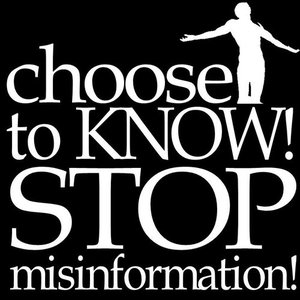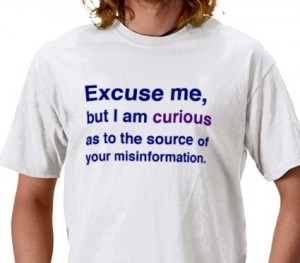How do I know if this is true? Evaluating everyday information.

What is false and what is true?
False information comes in many forms. It could be the e-mail that tries to convince you that you're the long lost relative of a prince in Uganda or the latest news report. The old adage is true, you can't believe everything you read.
Really there is no way to know unless you evaluate the information that comes to you everyday. I have to say I spend way too many hours on facebook correcting false information. Sorry, but when I see it I have to call it out because frankly it is frightening to me that the general public will readily post, e-mail or pass on a news report and never check the facts.
Why do we do this, well simply put...we want to believe what we want to believe regardless of whether it is fact based or not. Political debate is notorious for false information. It's passed on until millions believe it, yet very few ever take the time to research and validate whether what they are passing on is fact or just what matches their views.
But how do I know?
Being a librarian, false information is the bane of my existence and I'll spend hours, even days getting to the truth....but quite frankly the rest of the world doesn't usually care as much as I do, nor do they want to spend the time to check out the facts.
For those of you who want the truth but don't have the time or maybe not the sleuthing skills...guess what? You pay public librarian's salaraies everyday through your tax dollars. USE THEM! If you're not sure if you're reading the truth call the public library and have your local reference librarian check it out for you. Really we love this kind of stuff!
If you're a little more savvy though, why not find out for yourself. Here's a hint maybe 1% of those e-mail, facebook, and twitter warnings and political 'facts' you get are true....99% are not.
Normally there is just a bit of truth to any story....but just like anything if it's passed along and added to it's really doubtful that the original truth is anywhere near what you read today.
I'm going to let you in on a little secret that I teach students everyday. You have to evaluate your resources. Never take their word for it without some checking.
Here's what to look for:
Accuracy- can you find supporting documentation to this information. Do you see typos, bad links or sub par writing skills
Authority- does the author actually have the background to write on the subject. Usually this is education or experience based...make sure they know what they are talking about.
Objectivity/Bias- and this is a huge one. Folks if your story is biased and presents only one side there's a reason for that, the author is trying to sell you their opinion rather than fact. A good piece of information presents both sides and let you make the decision. Also watch for sites that sell the products they write about. If you see pop up adds for vitamins on a site telling you vitamin B is a wonder drug....do some research and make sure the information they are providing is fact based because when sites are set up to sell you something, they will say what they need to to get you to purchase. (you may be saying..Hey there's ads on this page...and you'd be right..so check my facts too.)
Currency- Is the information up to date? Currency is a big indicator of someone who's keeping up with the subject. If a site hasn't been updated since 1994, obviously the site creator forgot about it and so should you. Broken links are also a good indicator that the site creator no longer cares about the site.

Shhhh..the Librarian's secret
Since we are in the information evaluation biz...Librarians have a few tricks up our sleeves and we are certainly willing to share them if it stops even one bit of false information from heading through the grapevine.
One of the quickest easiest things anyone can do is use Snopes.com. Maybe you've even heard of them. They are an urban legend website, run by two people, who are out to find the truth. The don't profit from the site and they have no political aspirations. They are unbiased and provide just the facts. Great when trying to figure out if a tooth really will dissolve in Coke-A-Cola or if it's really true that egg whites are the cure all of the century. Of course in addition to those findings you'll also find a plethora of political myths debunked as well and this is probably the most notable use of Snopes.Snopes is the quickest way to get some facts, but as with anything if you still have doubts keep looking. Some others that are particularly useful during an election year are Politifact and Factcheck.
Ok this one is much less known that the previous one. Many websites, even .org sites are not who they say they are. They appear to be innocent on the front end, but they are actually backed by political campaigns, investor groups, right wing, left wing and even worse hate groups. They can cleverly disguise themselves so that you don't know their supporters, but I'm going to give you one simple website that will allow you to see right through them. Go to this site and simply type in any url (the site address listed at the top of the tool bar). You'll get a full report telling you who owns this domain name http://www.networksolutions.com/whois/index.jsp.
Having some heated political debates and who doesn't love those. Win with real facts and statistics. Want to know exactly where the federal budget is spent get it from the horse's mouth go to the government's official page. Be careful because if you Google government spending you're going to be presented with a plethora of 'government' sites that aren't really put out by the government (see the address above to see who's really behind these). If the url doesn't end in .gov, it is NOT a government site.
Did you know that Congress has a team of researchers that research every issue that is brought before them? The research includes all the facts and presents both sides of every issue. Handy stuff and you can see it too. The are called Congressional Reports and the government is required to share them with you.
Do it for the children!
We can stop the spread of false information before it's too late. Tell your friends, tell your children, tell anyone you can find these simple steps to help stop the spread of false information.
Are you a busy person and you just have to get that next e-mail forwarded? Before you take your finger off the send button and check it out. We know you're busy so take advantage of free library services. Libraries are web 2.0 now...if you don't want to call, e-mail or IM them....but please for the sake of those of us who really don't think they'll make it through another forwarded e-mail chock full of misinformation...check it before you send it!









